Vietnamese authorities are blocking defense lawyers from speaking with a journalist detained for criticizing Vietnam’s government, saying that their investigation into the writer’s case has not yet finished, one of the two attorneys told RFA on Thursday.
Independent journalist Pham Chi Dung was detained on Nov. 11 by security officers at his home in Ho Chi Minh City and charged with conducting “anti-state propaganda” under Article 117 of Vietnam’s Criminal Code.
According to police, Pham wrote anti-state articles and cooperated with foreign media to deliver “distorted information,” with rights group Defend the Defenders saying that Pham had contributed to Voice of America and the BBC, using different pen names.
Pham will be held in detention for at least the next four months as police finish their investigation, and if convicted could face a sentence of seven to 12 years.
Speaking on Thursday to RFA’s Vietnamese Service, defense attorney Manh Dinh Dang said that prosecutors informed him and fellow lawyer Mieng Van Nguyen on Dec. 16 that they can confer with their client only when investigators have finished their work.
“This limits lawyers’ ability to get involved,” Manh said, adding that lawyers’ access to their clients is typically restricted under Vietnamese law in cases of “national security,” with some cases dragging on for years.
Also speaking to RFA, former political prisoner Dai Van Nguyen, who was arrested on Dec. 16, 2015 on identical charges, said that he had immediately asked for a lawyer’s help when police officers invaded his home to conduct a search.
“But a representative from the prosecutor’s office presented a document saying this would not allowed until the police investigation was completed,” Dai said.
“This practice is stipulated in the Criminal Code, but it violates Vietnam’s constitution, which makes no distinction between ‘national security’ violations and ordinary [criminal] ones.”
According to Vietnam’s constitution, detainees have the right to meet with lawyers, and lawyers have the right to defend their clients, Dai said.
“However, the Criminal Code doesn’t allow for this,” he said.
Pressured to admit guilt
Speaking to RFA, activist Kha Nguyen Dinh, who was freed from prison in October 2018 after serving a six-year term for handing out leaflets criticizing government policy over disputed islands in the South China Sea, said he too had been denied the right to see a lawyer following his arrest.
“I was not allowed to contact anyone, and I had no legal consultation,” Kha said.
“Only after I had been led to say things they wanted to hear was I allowed to see a lawyer,” Kha said, adding that barring access to lawyers during police investigations makes it easier for officials to pressure detainees to admit their “guilt” or make other statements against their interests.
Vietnam has been consistently rated “Not Free” in the areas of internet and press freedom by Freedom House, a U.S.-based watchdog group.
Dissent is not tolerated in the communist nation, and authorities routinely use a set of vague provisions in the penal code to detain dozens of writers and bloggers.
Estimates of the number of prisoners of conscience now held in Vietnam’s jails vary widely, with Human Rights Watch putting the number in October at 138. The rights group Defend the Defenders meanwhile puts the number as at least 240, with 36 convicted this year alone.


